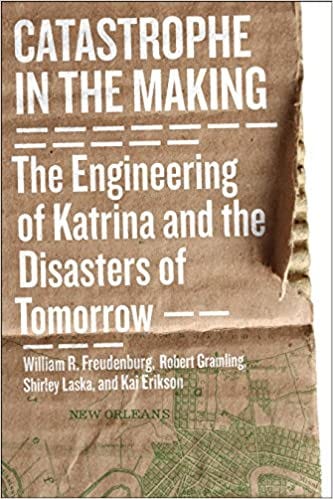My last post fell into a trope of arguing that politics is the reason why we can't have nice things, even when everything seems to point in a nice direction. Closing down the coal industry in China is associated with massive health benefits for miners, haulers, and breathers of all kinds. The economics of many plants is already zombie-ish, and energy security would not be deeply affected by even a shuttering of 186 plants as modeled in “A plant-by-plant strategy for high-ambition coal power phaseout in China” by Ryna Cui and co-authors. But … politics.
Politics has this problematic reputation of spoiling things, not undeservedly. The political scientist Ben Ansell recently announced that he’s writing a book titled Why Politics Fails on precisely the difficulties we face in achieving collective goals.

This will surely be a great, if not exactly easy or joyful, read. But I want to shift perspectives a bit. I want to talk about Katrina.
Now, granted, the catastrophe that befell New Orleans and the Gulf Coast associated with Katrina is not the most obvious place to begin a discussion about successful politics. Indeed, the devastation that came to those locations was not just a tragic case of a “natural disaster,” where nature struck people but was as much a story of the opposite — of people striking nature and paying dearly for it.1 The authors of Catastrophe in the Making place blame narrowly on the Mississippi River-Gulf Outlet (MRGO, which locals apparently referred to as Mister Go) and broadly on the “growth machine” that transformed the landscape for “development” in a myriad of ways, increasing the vulnerability of the growing population at each turn. With impressive historical detail, they lay out the money men and developers that pushed construction into lands more prone to flooding. (As an aside, like in many deltas, the high ground was actually close to the riverbanks as opposed to away from them, thus the buildings hugging the river on the old-timey map from the book’s cover). This pursuit of more more more reached its zenith with MRGO. As they write:
For decades, proponents claimed that MRGO would be amazingly busy, but in reality its main form of effectiveness proved to be in generating hyperbole, not actual commerce. As should be abundantly clear by now, MRGO was not built because it was “needed” by the economy of the United States, or for that matter, by the economy of New Orleans. The reason it was built, instead, seems to have involved a different form of at least apparent irreversibility—a set of political dynamics that, once in motion, led to the unquestioning support of a so-called development project that, in practice, turned out to be an egregious case of water welfare.
But despite the dire subject matter, the authors end on an optimistic note. They put forward as a “key requirement” that “all of us, scientists and citizens alike, need to be less willing to accept the claim that more sensible policy choices are not ‘politically feasible.” They continue:
In a political system that can be induced to spend well over $1.5 million in taxpayer money to simplify one round trip by a single ship, after all, it is clear that the limits of actual political feasibility go far beyond what most of us have ever been able to imagine. It may well be, instead, that the greatest limitations of the past have existed not in the world of politics, but in the boundaries we have drawn around our own imaginations.
Hopefully our political imaginations can stretch beyond pork-filled projects that vastly oversubsidize boat trips along a hurricane alley to incorporate cleaner, brighter futures for all. Politics does not just have to work for growth machines. Climate change can seem to just be a way to collapse expectations and learn to deal with less, but its gargantuan nature could also serve to wake many from what had been a decades-long comfortable, consumptive, neoliberal slumber. Resources can help our imaginations by visualizing changes at geographic scales, like Google Earth’s new timelapse feature, but ultimately it is up to us humans to contemplate, to configure, to contest, and to create these ideas and translate them into reality, through the sometimes dismal world of politics.
Christian Sorace’s excellent book Shaken Authority on the 2008 Sichuan earthquake makes similar points about the Chinese government’s work to shape the discourse so that the destruction of that event was seen as natural rather than manmade.




